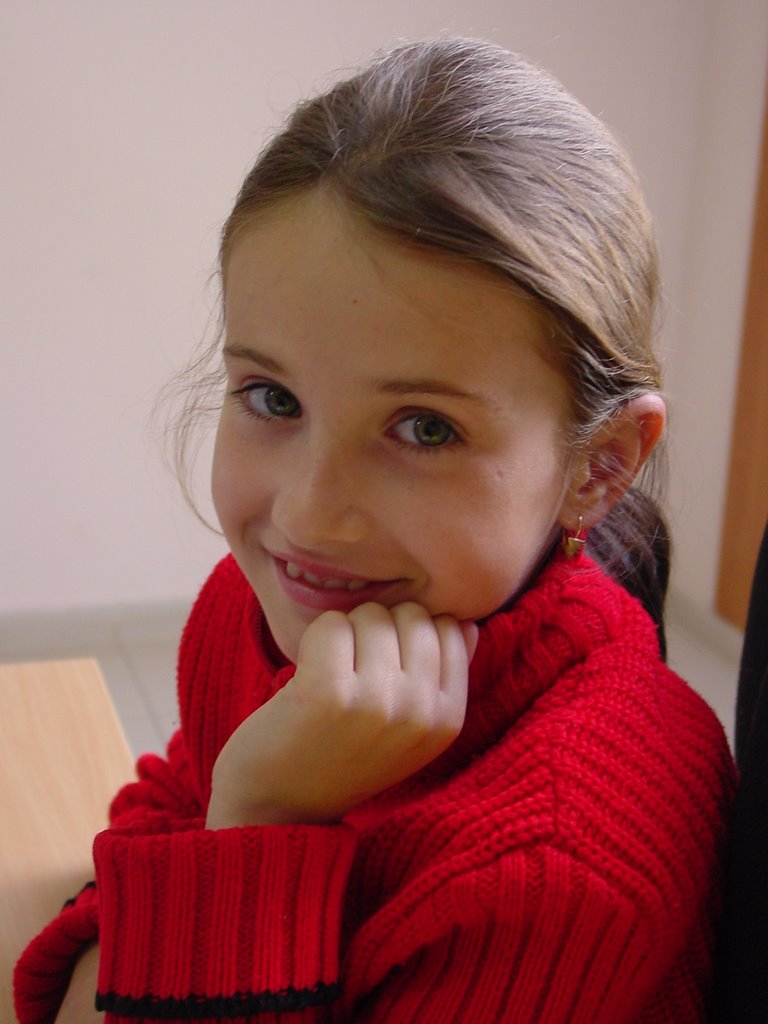Judicial Compassion
 I attended court this past Friday. I went on behalf of a girl I’ll call Jeanine. I met Jeanine last December when I was asked to bury her baby. When he was born the doctors immediately placed him on a respirator. He had a hole in his heart and was too unstable for the surgeons to even consider surgery. The infant died six days later.
I attended court this past Friday. I went on behalf of a girl I’ll call Jeanine. I met Jeanine last December when I was asked to bury her baby. When he was born the doctors immediately placed him on a respirator. He had a hole in his heart and was too unstable for the surgeons to even consider surgery. The infant died six days later.Jeanine had spent most of her life in ‘care.’ This is what we call a centre or home for children who are unable for one reason or another to live with their natural parents. In this case, having met Jeanine’s mother, I clearly understand why. I took Jeanine to visit her, primarily to act as a buffer between them, but also to be available when Jeanine told her mother that her baby had died.
Her mother didn’t care. In fact, her mother launched a vitriolic attack on Jeanine, telling her that she was incapable of caring for the ‘bastard’ child anyway, so what difference did it matter. Presumably for my sake more than her daughter’s, the mother then began to lob a litany of insults towards Jeanine, blaming her for all of the problems the mother had ever had. The woman wrapped up her denigrating summation of her daughter by accusing her of being the reason she was alone and without a partner.
By this time the mother had become red in the face and I intercepted both physically and verbally by slightly stepping in front of Jeanine and asking her mother if she wanted me to contact her regarding the funeral arrangements. The woman looked at me with honest amazement. She spat at me, ‘you’re going to bury that trash? Why the hell would you do that?’
I saw that the visit was a waste of time and I took Jeanine by the arm and led her away. She sat in the car in silence. I had expected her to cry. But she didn’t - not once. She was just numb. ‘That’s the way it has always been. She blamed me because her boyfriend liked me more than he liked her.’ And in an almost inaudible voice she added. ‘I was only ten.’
Jeanine told a teacher at school what had happened and the man was arrested. Her mother blamed her daughter. Consequently Jeanine was removed from their home for her own safety. As I understand it there had been a history of domestic violence involving numerous other partners the mother had over time. Social services deemed that it was safer for Jeanine not to return to the home without supervised visits. Her mother never chose to see her daughter. That has been over a period of eight years.
Since that time Jeanine has had a plethora of social problems. At sixteen she became addicted to drugs and spent several months in a facility. Approximately three months later she was admitted to a different facility under a suicide watch. She was no longer taking drugs, but she couldn’t cope with the emotional pain of her rejection from her mother.
When Jeanine left hospital the second time she was returned to her small flat where she was again alone. She had been prescribed psychotropic medications and was unable to work. In fact, I doubt she was able to do much of anything.
Trying to escape herself she left the safety of her flat and went to London. She told me that at the time she really didn’t know what she was going to do, other than try to find a girl she was in care with several years before. She had an idea where the girl lived, but wasn’t too sure, but she thought that by asking people in the area she could find her. She described the girl as the ‘closest thing to a sister she ever had.’
Having never found her friend, Jeanine slept rough on the streets for several days. A man befriended her and offered her a place to stay. She told me that at first he was nice to her, but later when he wanted a physical relationship and she didn’t, he became abusive. She said she finally let him do whatever he wanted. He gave her £10 the next morning for food. She used it to take the train back to the coast. She learned two months later that she was pregnant. She told her doctor that she would be a good mother and now her life would change for the better.
Here in Britain, when you’re expecting a baby, you would typically register with your doctor for antenatal checkups. Additionally, if you’re receiving any social benefits, registering the birth of your child would provide a small supplemental stipend to help with costs and living expenses after the baby is born.
Britain has an excellent midwifery programme and home visits are part of the scheme after your child is born. During that time the midwife will check both the baby and mother’s progress. Should the midwife feel that either requires further attention or referrals to other agencies, typically, they would take care of that as well.
But since Jeanine’s baby died several days after her birth she was never referred to the midwifery programme. When she was released from hospital she was sent home and told to come visit her baby in hospital. She had been out of hospital two days and had made the trip to hospital by bus on both days to see her baby.
The morning that the infant died Jeanine wasn’t aware until she arrived at hospital. She didn’t have a phone or mobile. She took the morning bus for the fifty-minute ride to the hospital. She says she doesn’t remember how she came home.
No one came to see Jeanine. No one cared about her. In fact, no one knew her. She was just another statistic.
When I first came to her small flat I immediately noticed mountains of mail overflowing from a small box near the door entrance. Some were clearly marked; water board, Gas Company, many brown envelopes from social services. I couldn’t notice the others.
At the time my focus was on helping her get through the burial of her baby. She had no idea what to do or what she wanted. She admitted to me she had never been in a church and wasn’t even certain that she believed in God. She did ask me, ‘if God lets these things happen why is He supposed to be so good?’
Most funeral services charge no fees for children and this was the case for Jeanine. She asked me if she could go to the funeral home and hold her baby one last time. In many instances this isn’t prudent. But thanks to the professionalism and compassion from a friend who works at the home, Jeanine was able to hold her baby, wrapped in such a way that she could see her son’s face one last time.
Again, she didn’t cry. I stood with her and watched as she held her son as if she were caring for him, just as any mother would care for their own healthy baby.
On a cold dark December morning, just a few days before Christmas, we laid one of God’s children to rest. It’s a pitiful sight to see a tiny white coffin lowered into the hard cold earth. And as I committed his soul to God’s care, Jeanine broke into tears. She kept apologising to me and towards the grave. Through her tears she kept saying she was sorry. When I asked what were her apologies for, Jeanine said that God must think she is bad to have let her son die. I couldn’t hold back my own tears.
I’ve visited Jeanine regularly since December. I’ve encouraged her to become involved in community activities, coming to church, meeting people. But sadly, my endeavours have been unsuccessful. I’ve watched her lose weight and I’ve carried meals to her in the evenings. And when I’ve insisted on remaining with her until she ate, she would politely say that she was just too tired and say she wanted to sleep.
I spoke with her doctor on several occasions and we both share the same concerns. As the doctor has explained to me; Jeanine is not ill enough to be hospitalised again, yet she is not mentally well enough to be on her own. She’s been placed on a home-visit scheme for visits by a mental health officer. But Jeanine tells me the man seems rushed and attempts to push her into taking ‘mental exercises’ which she describes as ‘stupid.’
I couldn’t imagine more happening to Jeanine until my visit with her two weeks ago. When she answered the door I asked how she was. She told me that she was going to prison. I was shocked and asked her why. She handed me a piece of paper. It was a warrant that had been served on her for her failure to notify Social Security that her son had died. (to be precise, ‘receiving benefits to which she wasn’t entitled’). They had been paying her benefits since his death. And when she failed to answer their letters about the baby’s death, whoever the paper pusher is at Social Security decided, without a scintilla of curiosity or compassion, that she was being dishonest.
The mountain of unopened mail would suggest otherwise. She simply didn’t know or care. I had ignored the mail myself, only because during my visits I was trying to focus on her immediate needs and I had referred her to both social services and her doctor. Therefore I assumed (wrongly) that they had been helping in those matters.
I told her that I would go to court with her and I would speak with the judge on her behalf. Jeanine cried with exasperation. I made her a cup of tea and sat as she fell asleep on her sofa.
I gathered her post and opened all of the envelopes. There were many bills from the utility companies along with a number of ‘final notices.’ Inside some of the Social Security envelopes there were giro cheques. She hadn’t even cashed the last two months worth of cheques. She simply didn’t have the presence of mind to think of contacting anyone. The child couldn’t take care of herself, much less societal responsibilities.
I found a solicitor who would represent Jeanine at court. Legal Aid paid for her representation. According to the solicitor it would all be straightforward. He didn’t anticipate anything particularly ‘bad’ happening, other than there would probably be an order for her to repay the overpayments. This was especially in light of the fact it was clear she had suffered so much and was clearly not in an emotional state to manage her affairs.
Our judicial system requires that the defendant stand in a ‘witness box’ to proffer their testimony. I was saddened to see Jeanine have to do this. She looked pitiful. After Jeanine was sworn in the clerk read out the charge against her. I can’t recall exactly who asked what was her response to the charge.
But Jeanine’s response I clearly remember. She looked around the courtroom; I couldn’t see her focus on any one person. But then she looked up at the judge and said ‘I’m guilty. I’m guilty of everything. I’ve always been guilty, so just do whatever it is that you’re going to do to me. I don’t care anymore…about anything.’
The solicitor immediately intervened and said that his client had been undergoing a severe amount of stressful events, including the recent loss of her son. He went on to explain that the fact she hadn’t notified Social Services of the change in circumstances wasn’t with malicious intent and he explained that he had in his possession three of the giro cheques that hadn’t been cashed.
The prosecutor then spoke. She told the court that all HM’s Government was seeking was an order of repayment and ‘possibly’ a fine.
Jeanine stood in the box with her head slumped. If she was aware of what was happening around her, I couldn’t tell.
Her solicitor told the court that I was there to speak on her behalf. I shared what I knew of Jeanine and explained how I had watched her deteriorate since the day I had met her. I also told the court that it was my opinion that there was no malice of forethought on Jeanine’s part in the receipt of funds inappropriately. I felt the truth was that everyone she had encountered in her life had either abused her or failed her. I added that I felt all of us, including our government had also failed her.
There really wasn’t much more that I could offer. I wasn’t certain what would happen. I assumed that the courts would issue an order for her to repay the small amount she had received over the past five or six months, plus possibly a fine.
The judge then spoke. He asked Jeanine if she had ever been summoned to court before. She told him that she had to go to court when her mother’s friend ‘touched her.’ The judge asked how long ago that had been. Jeanine couldn’t answer and the solicitor looked towards me with eyes asking if I knew. I volunteered that I believed that had happened when she was ten.
The judge was quiet for a moment. It seemed to be a long time, but I think I just felt nervous for Jeanine.
Then the judge looked at Jeanine. He told her that if he were to make a ruling finding that she had intentionally taken the funds it could possibly have future consequences. I felt my throat tighten when he said this. My immediate thoughts were that she was going to be sent to prison. But then the judge added; ‘if I issue an order instructing you to repay the funds, you will have a reduction in the benefits you currently receive.’
He went on to add ‘And if I were to do that, I believe that it will be an even greater struggle for you to climb above the most horrendous life you have had. Therefore as resolution of this matter, this court is ordering you to sit in the back of this courtroom until the matters of business for the day are concluded.’ The judge asked the solicitor if he understood what this meant.
The solicitor asked the judge to clarify the ruling. The judge said ‘ this court has imposed a sentence that requires the defendant to remain at the back of the courtroom until our normal business of the day is concluded. The order does not include a restitution order. I do not believe to do so would be in the interest of justice. Therefore, upon completion of the sentence, at the close of this court’s business, the defendant is free to go.’
Jeanine didn’t fully comprehend what had been said. The clerk asked her to step down and the solicitor walked over to her and asked her to have a seat next to me. Jeanine asked me what had happened and I told her I’d explain again after the court finished. But to my surprise the Judge then asked the clerk to call the next case.

The clerk advised the court there were no further cases on the docket. The judge looked back towards us and spoke to Jeanine. He told her she was free to go. And on that we all rose and the judge left the courtroom.
We hear so much of how our governments fail people. We may hear, but too easily forget, how often we fail one another.
I give thanks for the wisdom and compassion shown by Her Majesty’s courts. And I give thanks for the wisdom and compassion shown towards another human being.
.
Big World Small Boat
.



0 Comments:
Post a Comment
<< Home